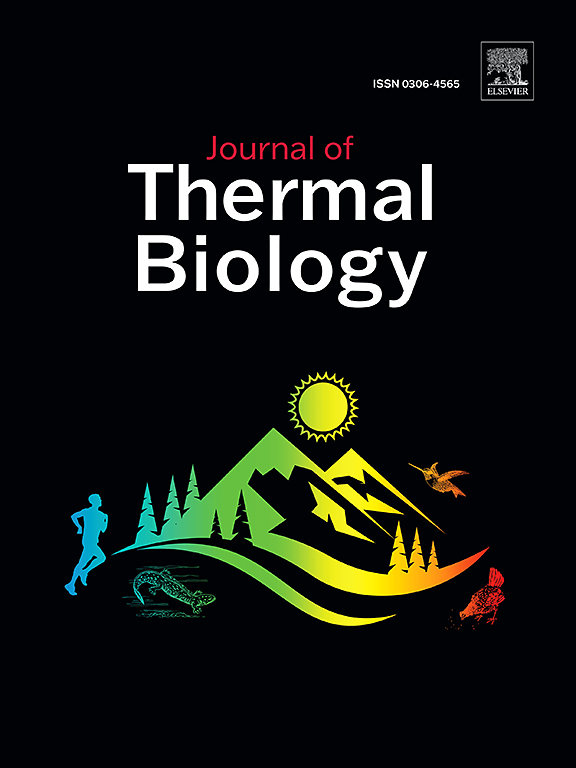Resveratrol improves boar semen quality in summer months through modulation of the AGEs-RAGE signaling pathway in Leydig cells
IF 2.9
2区 生物学
Q2 BIOLOGY
引用次数: 0
Abstract
The high ambient temperature and relative humidity in summer months induce the reduction of boar semen quality, which generates adverse effects to the productivity and economic benefits of swine farms. It has been investigated that resveratrol (RSV), a naturally occurring polyphenol, can effectively improve oxidative damage, but its functional roles and underlying mechanisms in improving boar semen quality in summer months remain unclear. Herein, we mainly explored the regulatory and functional roles of RSV in boar semen quality in summer months. Analysis of average functional sperm numbers throughout the year confirmed reductions during summer (April–September) in all three genetic lines, with Duroc boars exhibiting the most severe decline (reaching a nadir of 0.60 × 1010/mL in July) and highest variability. Dietary supplementation of RSV demonstrated positive effects to improve sperm concentration, sperm motility, and semen metabolites in summer months through enhancing the antioxidant capacity of semen and serum. Additionally, heat stress induced the structure damage of porcine Leydig cells, a higher ROS, MDA, and AGEs levels, as well as a lower testosterone level. Pretreatment with RSV (200 nM/mL) attenuated the heat stress induced oxidative stress, reduced AGEs accumulation, and restored testosterone production. Mechanistically, RSV inhibited the heat stress-activated AGEs-RAGE signaling pathway, and subsequently reducing oxidative stress. These findings explored that boar semen quality declined during summer months, and that RSV improved the boar semen quality in summer months through modulation of the AGEs-RAGE signaling pathway in Leydig cells.
白藜芦醇通过调节睾丸间质细胞的age - rage信号通路提高夏季公猪精液质量
夏季较高的环境温度和相对湿度导致公猪精液质量下降,对养猪场的生产力和经济效益产生不利影响。研究表明,白藜芦醇(resveratrol, RSV)是一种天然多酚,可有效改善猪夏季精液的氧化损伤,但其在提高猪夏季精液质量中的作用及其机制尚不清楚。本文主要探讨RSV对夏季公猪精液质量的调控作用和功能。对全年平均功能精子数量的分析证实,在夏季(4月至9月),所有三个遗传品系的精子数量都有所减少,杜洛克公猪的下降最为严重(7月达到0.60 × 1010/mL的最低点),变异率最高。在夏季,饲粮中添加RSV可通过增强精液和血清的抗氧化能力来改善精子浓度、精子活力和精液代谢产物。此外,热应激导致猪间质细胞结构损伤,ROS、MDA和AGEs水平升高,睾酮水平降低。RSV预处理(200 nM/mL)可减轻热应激诱导的氧化应激,减少AGEs积累,恢复睾酮分泌。机制上,RSV抑制热应激激活的age - rage信号通路,从而降低氧化应激。这些结果表明,夏季公猪精液质量下降,RSV通过调节间质细胞的age - rage信号通路改善了夏季公猪精液质量。
本文章由计算机程序翻译,如有差异,请以英文原文为准。
求助全文
约1分钟内获得全文
求助全文
来源期刊

Journal of thermal biology
生物-动物学
CiteScore
5.30
自引率
7.40%
发文量
196
审稿时长
14.5 weeks
期刊介绍:
The Journal of Thermal Biology publishes articles that advance our knowledge on the ways and mechanisms through which temperature affects man and animals. This includes studies of their responses to these effects and on the ecological consequences. Directly relevant to this theme are:
• The mechanisms of thermal limitation, heat and cold injury, and the resistance of organisms to extremes of temperature
• The mechanisms involved in acclimation, acclimatization and evolutionary adaptation to temperature
• Mechanisms underlying the patterns of hibernation, torpor, dormancy, aestivation and diapause
• Effects of temperature on reproduction and development, growth, ageing and life-span
• Studies on modelling heat transfer between organisms and their environment
• The contributions of temperature to effects of climate change on animal species and man
• Studies of conservation biology and physiology related to temperature
• Behavioural and physiological regulation of body temperature including its pathophysiology and fever
• Medical applications of hypo- and hyperthermia
Article types:
• Original articles
• Review articles
 求助内容:
求助内容: 应助结果提醒方式:
应助结果提醒方式:


